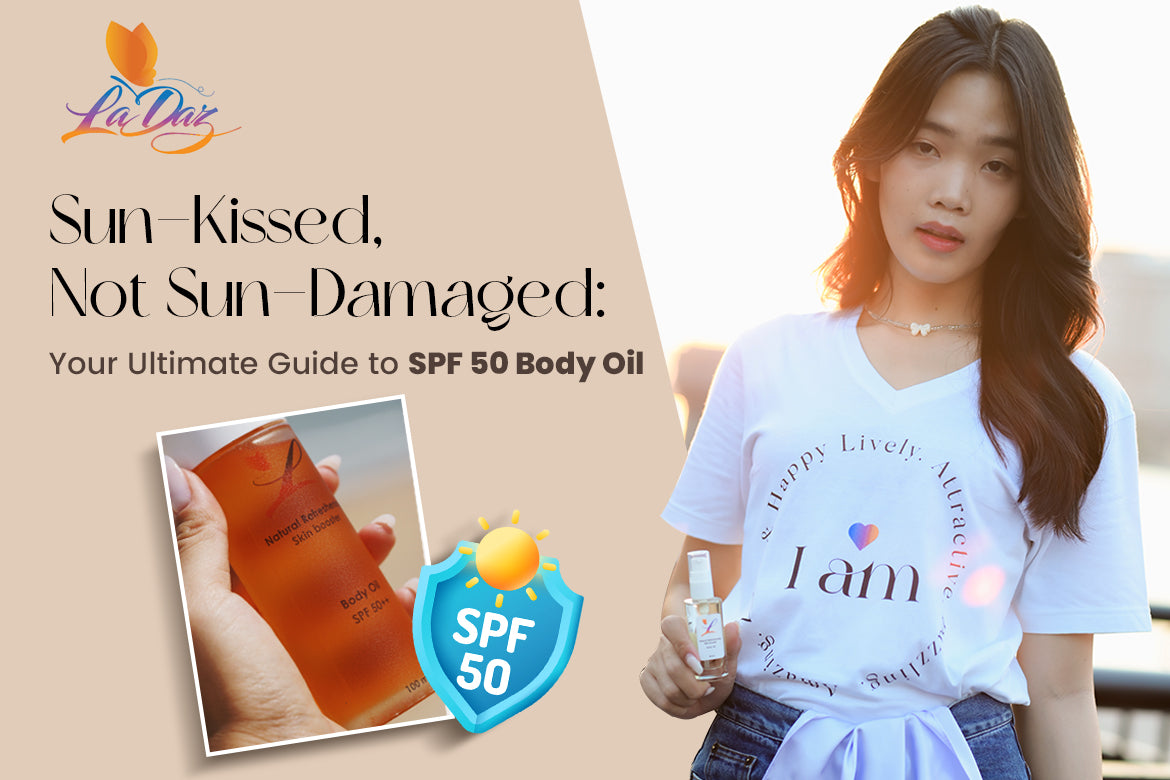No Products in the Cart

Summer is in full swing, and the sun's rays are stronger than ever. While we all love that sun-kissed glow, it's important to remember that exposure to ultraviolet (UV) radiation can be damaging to our skin. That's where SPF 50 body oil comes in—your ultimate shield against sun damage. In this guide, we'll break down everything you need to know about SPF 50, from UVA and UVB protection to PA ratings, and why this natural skincare essential should be part of your daily routine, even on cloudy days. After all, UV rays can penetrate clouds, so sun protection is crucial year-round for healthy, radiant skin.
SPF stands for Sun Protection Factor. It's a numerical rating system that indicates how effectively a sunscreen protects against UVB rays, the primary cause of sunburn. An SPF 50 body oil blocks approximately 98% of UVB rays. This means that for every 1,000 UVB rays that hit your skin, only 20 will be able to penetrate. This significantly reduces your risk of sunburn, premature aging, and even skin cancer.
UVA rays have a longer wavelength than UVB rays and penetrate deeper into the skin's layers, reaching the dermis. This is the layer where collagen and elastin, the proteins that give skin its structure and elasticity, are produced. UVA ray exposure can damage these proteins, leading to premature aging, wrinkles, and loss of skin firmness. UVA rays can also contribute to skin cancer.
UVB rays are shorter in wavelength and primarily affect the skin's surface layer, the epidermis. They are the main culprit behind sunburn, causing redness, swelling, and pain. UVB rays can also damage skin cells and increase the risk of skin cancer.
PA (Protection Grade of UVA) is a rating system developed in Japan to measure a sunscreen's ability to protect against UVA rays. Unlike SPF, which is a single number, PA ratings are indicated by plus signs (+), ranging from PA+ to PA++++. The more plus signs, the higher the UVA protection. Here's a breakdown of the PA rating system:
When choosing a body oil, look for one with at least a PA+++ rating to ensure good UVA protection. While the PA rating system isn't yet widely used globally, it's becoming increasingly popular and can be a valuable tool for selecting sun protection products.
Many traditional sunscreens contain harsh chemicals that can irritate sensitive skin. A natural SPF 50 body oil offers a gentler and more nourishing alternative. Here's why you might choose the Ladaz and natural option:
Generous Application: For optimal protection, apply a sufficient amount of body oil to cover all exposed skin. Think of it as a thin, even layer from head to toe, including often-forgotten areas like the ears, neck, and tops of feet. A helpful visual is using about a shot glass full of body oil for your entire body.
Timing is Key: Allow the body oil to fully absorb into your skin before sun exposure. Waiting 15-20 minutes is ideal. This gives the oil enough time to form a protective barrier on your skin.
Reapply Regularly: Even the most water-resistant sunscreens need a touch-up. Reapply every two hours for consistent protection, or more frequently if you're swimming, sweating, or toweling off. Continuous application is essential to maintain your skin's defense against harmful UV rays.
SPF 50 body oil isn't just about sun protection—it's about taking care of your skin. When used regularly, it can help to prevent premature aging, reduce the risk of skin cancer, and nourish your skin with natural ingredients. Whether you're heading to the beach, spending time outdoors, or simply want to give your skin some extra love, a natural SPF 50 body oil is a must-have in your skincare arsenal.
Remember: Sun protection is a year-round necessity. Don't let cloudy days fool you—UV rays can still reach your skin, even when the sun isn't shining brightly. By making SPF 50 body oil a part of your daily routine, you can safeguard your skin's health and keep it looking radiant for years to come.
 @Ladaz
@Ladaz